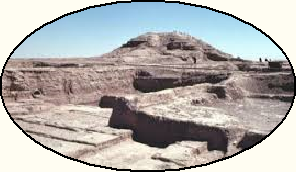Spadina Literary Review — edition 11 page 16
.../
Still, what exactly was the link between Inanna and civilization that underpins this story? Echlin does not spend much time interpreting the myths in terms of historical events, and I don’t blame her since the old Mesopotamian era is extremely hazy. The “Inanna and Enki” myth seems to relate to that period when Uruk displaced Eridu as Sumer’s most powerful city-state. Uruk was peculiar in having two chief gods, on account of the city having been formed by the merger of two adjacent temple communities, one ruled by An (“Sky”), the other by the ambitious and thrilling goddess who came to be known as Inanna ("Lady Sky") and made everyone including An himself completely forget that he was already hitched to someone else (to a faded earth goddess named Uraš).

Uruk: the hub that used to be
Now, the way cults and deities grew in wealth and influence was through the assertiveness of their priests and acolytes, their showmanship, their ability to spin tales and draw crowds, their ability to keep the offerings of food and materials flowing in from the followers. When it came to all that, Inanna’s priests and priestesses were hard to beat. They insisted that their goddess be honored to the same degree as the patriarchial An, more so if possible. Altho no doubt Uruk’s ascent depended on the blessing of the all-seeing sky god, it would be Inanna, all by herself, who would snap up the credit for instilling the much-needed civilized culture as the city's population surged due to the influx of hunter-gatherers, herders and fishermen from the hinterland. Those readers familiar with the Epic of Gilgamesh will recall the method by which the wildman Enkidu got seduced (no pun intended) by the pleasures of city life.
Kim Echlin is, as I said, less inclined than myself to set off on historical tangents, and probably it's true that for some readers such background would deter their enjoyment of this book. Echlin says she is writing primarily for “those who love storytelling and myth” and her guiding principle for Inanna was to preserve “the power of the poetry.” She has done a terrific job at that. The poetry ranges from intimate to festive, but always manages to be simple and moving. Buy this book, verse lovers, and look at the first verses that were ever written down. Or rather, cuneiformed down.